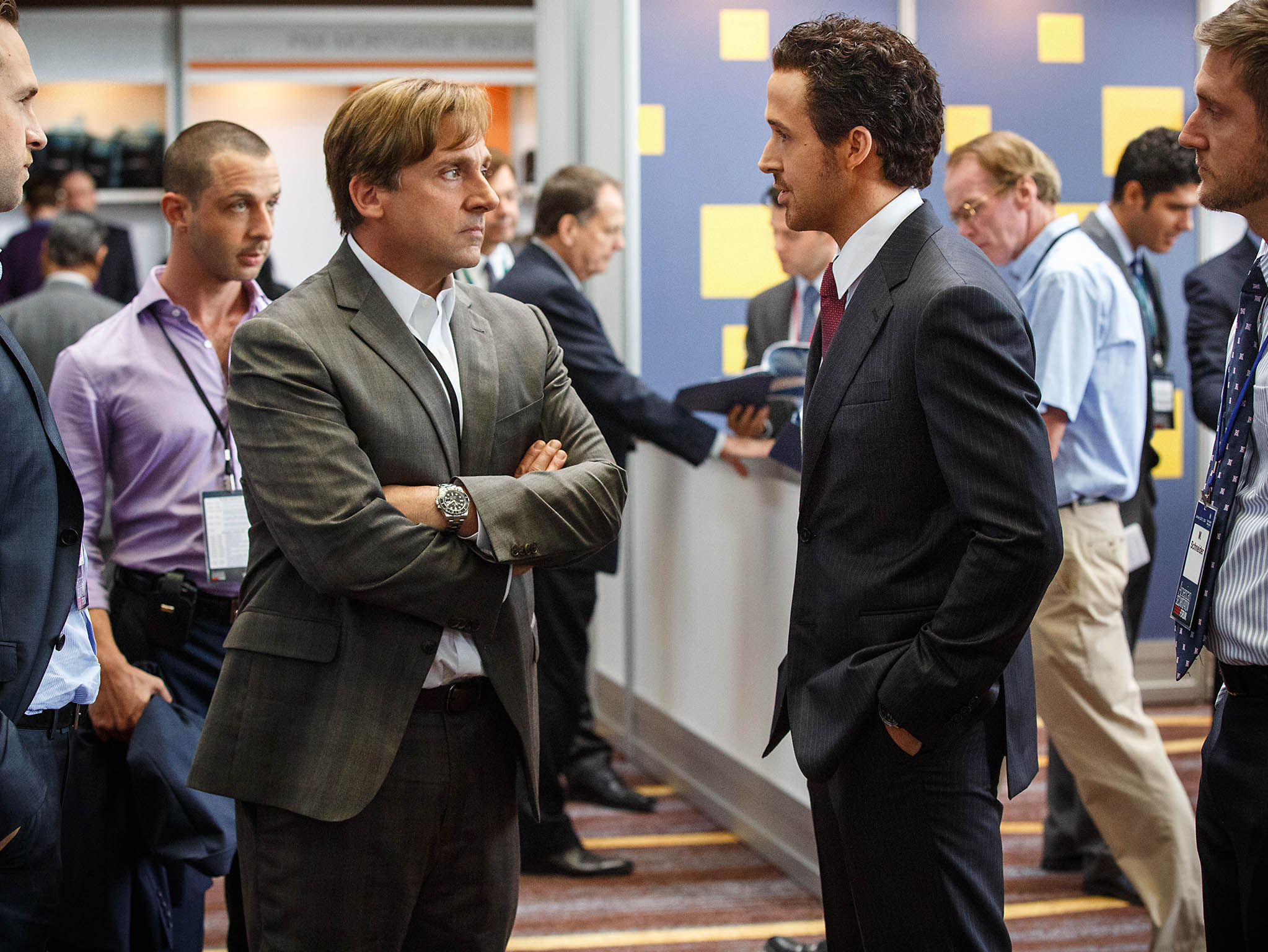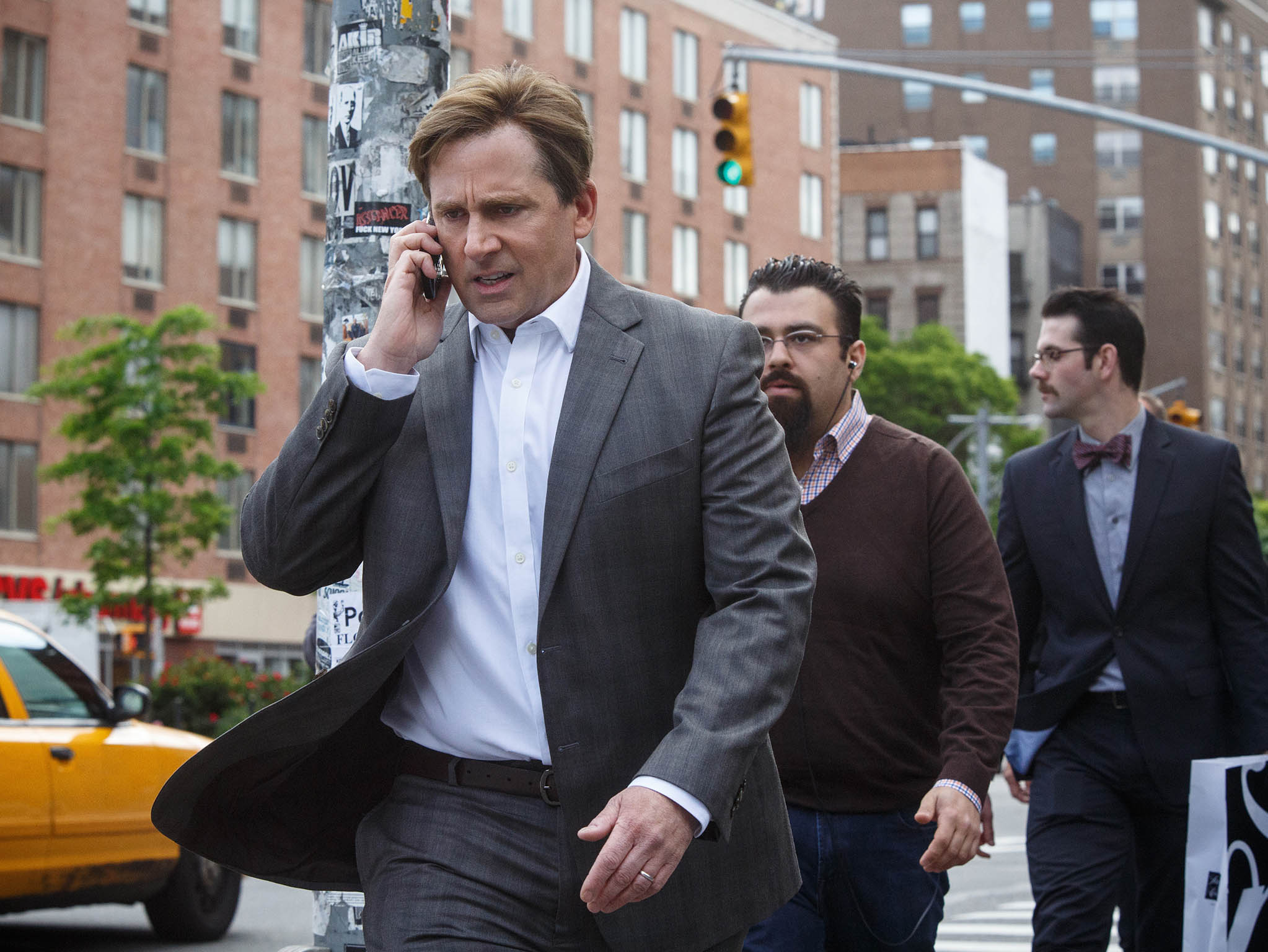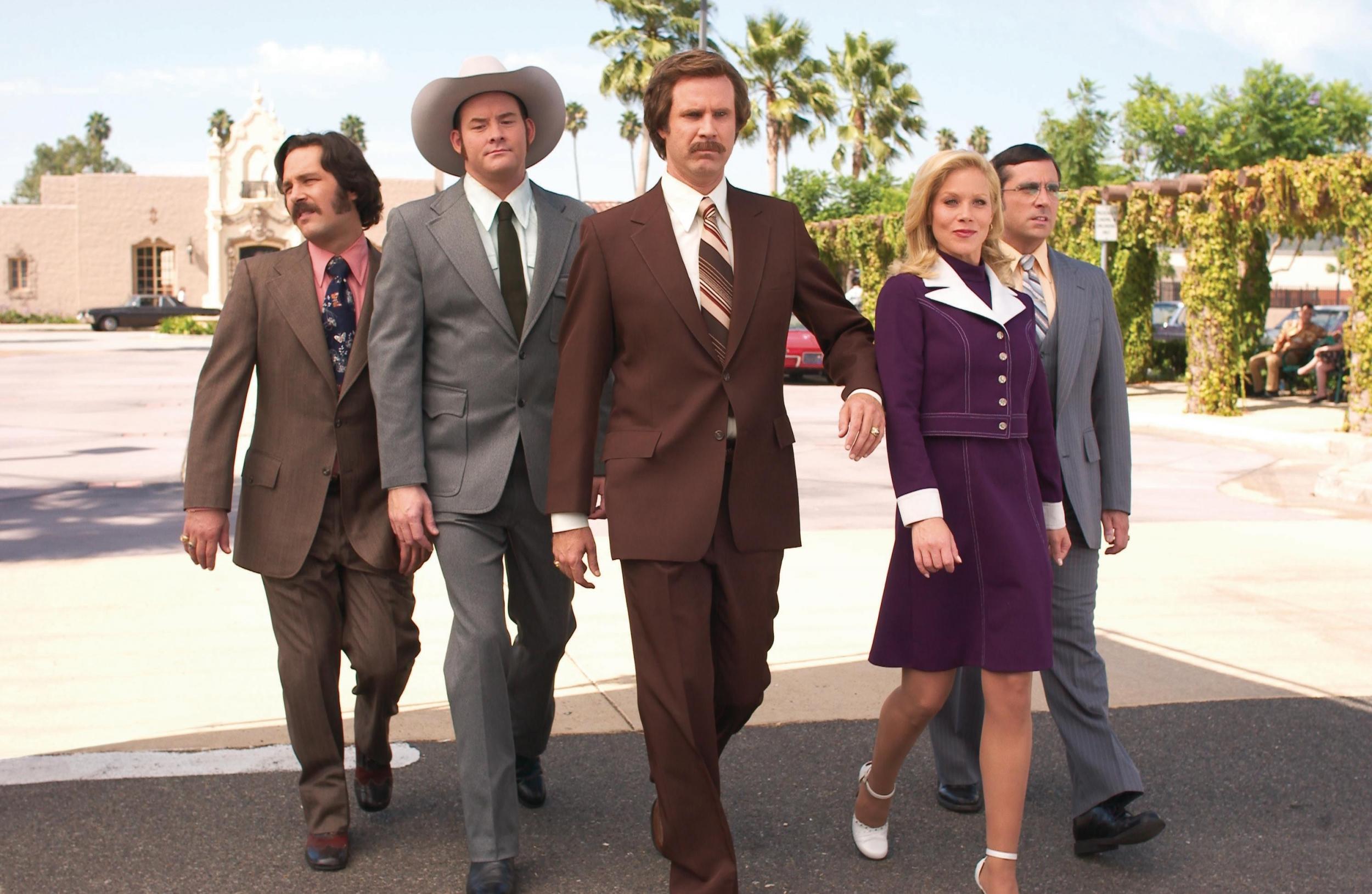Steve Carell interview: The Big Short is the Golden Globe-nominated drama that takes on the 2008 economic crash
Why the guy who provides the laughs in ‘The Big Short’, about the 2008 financial crash, keeps his politics to himself

Your support helps us to tell the story
From reproductive rights to climate change to Big Tech, The Independent is on the ground when the story is developing. Whether it's investigating the financials of Elon Musk's pro-Trump PAC or producing our latest documentary, 'The A Word', which shines a light on the American women fighting for reproductive rights, we know how important it is to parse out the facts from the messaging.
At such a critical moment in US history, we need reporters on the ground. Your donation allows us to keep sending journalists to speak to both sides of the story.
The Independent is trusted by Americans across the entire political spectrum. And unlike many other quality news outlets, we choose not to lock Americans out of our reporting and analysis with paywalls. We believe quality journalism should be available to everyone, paid for by those who can afford it.
Your support makes all the difference.“Oh my god, we are starting right there,” says Steve Carell. I’ve just asked him if he thinks capitalism makes us morally corrupt. It’s the dilemma his character, Mark Baum, faces in The Big Short, the Golden Globe-nominated drama that deals with the 2008 economic crash.
Baum is based on Steve Eisman, a hedge-fund manager who bet that the US sub-prime housing market would cause the banks to lose billions. So it’s not such an odd question, yet Carell gathers his thoughts before answering, “I don’t know. I’m just an actor,” he says. “I don’t think that it’s necessarily true. I think it can, but I don’t think it’s a steadfast rule.”
I must admit I was expecting a more animated answer from the man whose first brush with the mainstream was doing a pastiche of investigative journalism on The Daily Show, where he worked alongside Stephen Colbert and Jon Stewart.
It’s also odd, given the way his career has been shaped by making observations on real-life events, that he decided to hide behind being “just an actor”. The Daily Show was political satire. He proved himself to be one of the great comedians of his generation in films such as Anchorman and The 40-Year-Old Virgin, one of the best comedies made this century, which he co-wrote with the celebrated director Judd Apatow. Carell is a very funny man. At least he is on screen. In person, he has a mild manner and speaks at a slow, deliberate pace that seems designed to give him time to weigh up every response.
Even as he has moved from doing comedy to more serious roles in recent years, it is reality that interests him. In Foxcatcher, for which he received an Oscar nomination, he played John du Pont, a US philanthropist and wrestling coach-turned-murderer.
In Freeheld he plays Steven Goldstein, the placard-waving founder of Garden State Equality, who campaigned in support of police officer Laurel Hester as she fought to have her pension benefits transferred to her same-sex partner. Carell, 53, will also be starring in Battle of the Sexes, about the infamous 1973 tennis match between Billie Jean King and Bobby Riggs.
Carell says of his penchant for playing real people: “There is something accessible about portraying a real-life person and a historical event, and there is a responsibility built into that as well, which I like. You still have free rein to interpret, but the groundwork is already laid and, with the reality, you don’t have to build much in terms of your own reality because it already exists.”
Apart from Du Pont, he has tried to meet the person he is playing in order to discover that reality. For The Big Short, he met Eisman. “I tried to get an idea as to what made him tick and what he was feeling through this period of time [in the months before the crash],” explains Carell.
“There was a sense of outrage that he exudes, and still does. I think all of these guys are still reeling from what happened, even seven years later. They are all still angry and none of them can quite believe that nobody went to jail and no reforms were put in place.”

Watch Apple TV+ free for 7 days
New subscribers only. £8.99/mo. after free trial. Plan auto-renews until cancelled

Watch Apple TV+ free for 7 days
New subscribers only. £8.99/mo. after free trial. Plan auto-renews until cancelled
Judging by the roles he picks, he seems politically engaged. Yet when I ask if away from the screen he shares that outrage or likes to crusade or support campaigns, he again replies with a straight bat. “I don’t really wear my politics on my sleeve. I just tend not to.”
And yet he is enamoured by characters who have a bee in their bonnet. The Big Short is reminiscent of The Daily Show in its use of comedy to highlight malaise in society. “It was the sense of outrage that drew me to the part in The Big Short,” says Carell. “It was the conflict that I sensed within Eisman that about what he stood to gain from the collapse of the economy. There was such a grey area to the guy that I thought was interesting and unique, that I liked him. He’s a very intelligent, brash, outspoken, sensitive person and I was drawn to that.”

The Big Short is directed by Adam McKay, who was first introduced to the Massachusetts-born Carell in Chicago by Carell’s then-girlfriend and now wife of 20 years, Nancy. At the time, Carell was performing with the comedy troupe The Second City, where Stephen Colbert was once his understudy.
It was McKay who gave Carell the part of weatherman Brick Tamland in Anchorman, which brought the actor international fame. Yet he says it has taken him more than two decades to understand Carell. “I really got Carell on this movie,” says McKay. “Working with him on this film was very different to the comedies. I just realised he has a great instinct for when it’s for real and when it’s bullshit.”
So how has Carell changed in that time? “You know what… he’s always been a good guy,” McKay tells me. “But he’s gotten very sweet. He’s a very sweet guy. I love my family like crazy, but you can see with him that every time he’s away from his family it pains him. I get this warmth from him. Our relationship has evolved and we were always friends through the Anchorman things, but I feel like we have really become friends now. It’s kind of warmer and sweeter, and that’s the things I see. Maybe that’s from doing more dramatic roles; he’s opening up a little more.”
The actor seems happiest when talking about his process, or other people. Carell says: “I love working with directors and I love exploring. It’s interesting. Did you see The Truman Show? The scene where [Jim Carrey] is in the boat and he bumps up against what is essentially the edge of the set, and he realises that there is no more there. It’s interesting to think of that in terms of your brain, and when you find yourself bumping up against the limits of what you perceive as your frame of reference, or your ability, or the things that are established to yourself. I think with the right director that can expand out, because that director is giving you a licence to go to other places that you haven’t established for yourself.”

So are the boundaries put on Carell the same as those for Truman – an expectation that he will be funny and entertain? Have his recent dramatic roles been his attempt to confound expectations?
For the first time, Carell becomes animated when he says: “I don’t care how people perceive me. I think to choose parts based on how it’s going to be perceived and how people will interpret me as an actor doesn’t help me. If people think of me as a comedic actor that’s fine, and as a dramatic actor, whatever. I’m fortunate to be getting jobs and working, so people can think what they want.”
At the Golden Globes last Sunday, it was a surprise that host Ricky Gervais didn’t make jokes at Carell’s expense. Carell has been the butt of the British comedian’s gags ever since Carell took on the principal role in the US version of Gervais’s The Office.
It was some feat that Carell managed to make a success of the role. He also dismisses the supposedly divisive presentational skills of Gervais, saying: “I don’t think he is divisive in any way. Everyone I know is a fan.”
One ambition Carell has managed to cross off his bucket list is to get to work with Woody Allen again. He starred in Melinda and Melinda in 2004 and more recently he replaced Bruce Willis in an as-yet-untitled drama.
He says of Allen: “I don’t know what I was expecting. He was very nice, he was very smart. I think the part that I expected was that he was quiet. He is not an overly gregarious person, but he is methodical and really respects actors. I don’t know, he’s the type of person you just don’t question.”
‘The Big Short’ is released on Friday
Join our commenting forum
Join thought-provoking conversations, follow other Independent readers and see their replies
Comments